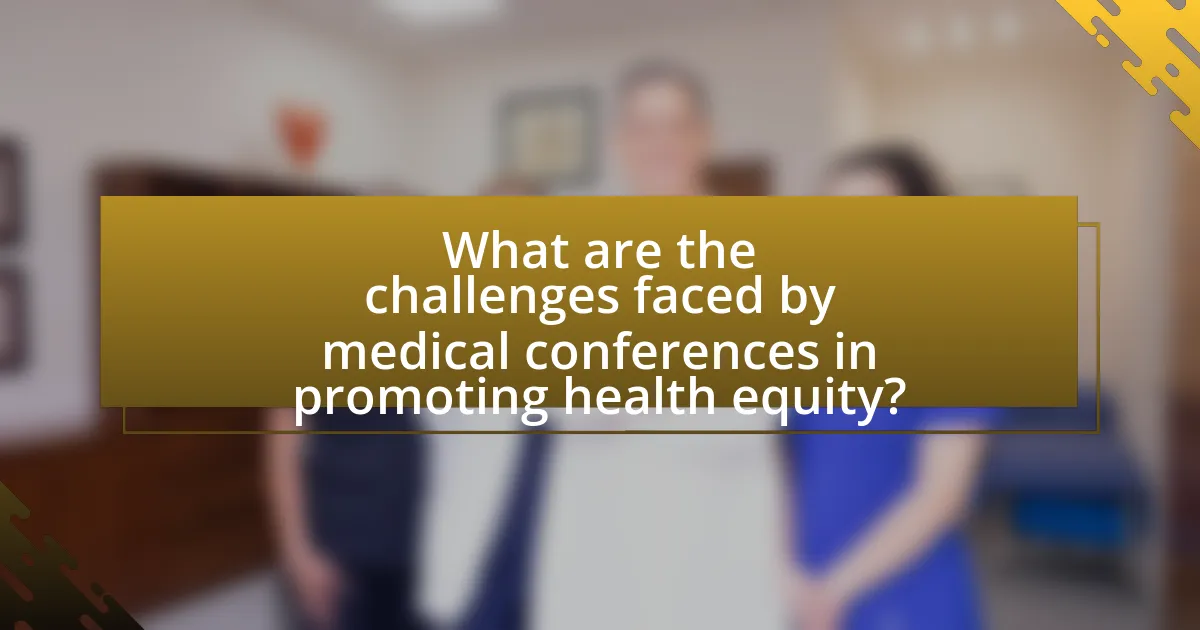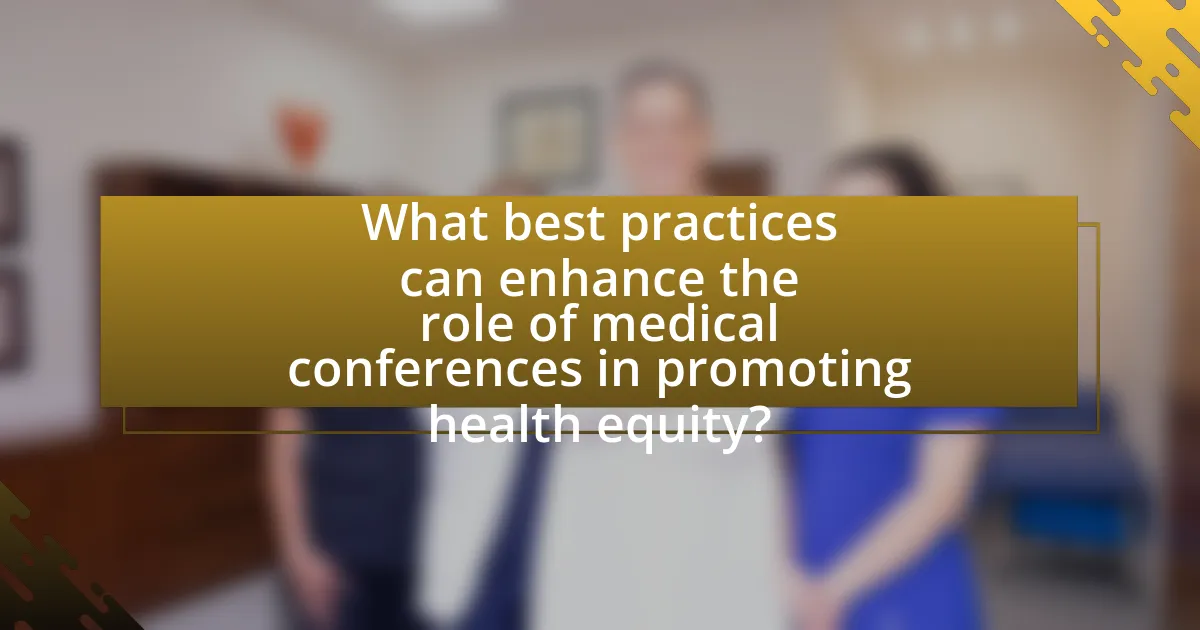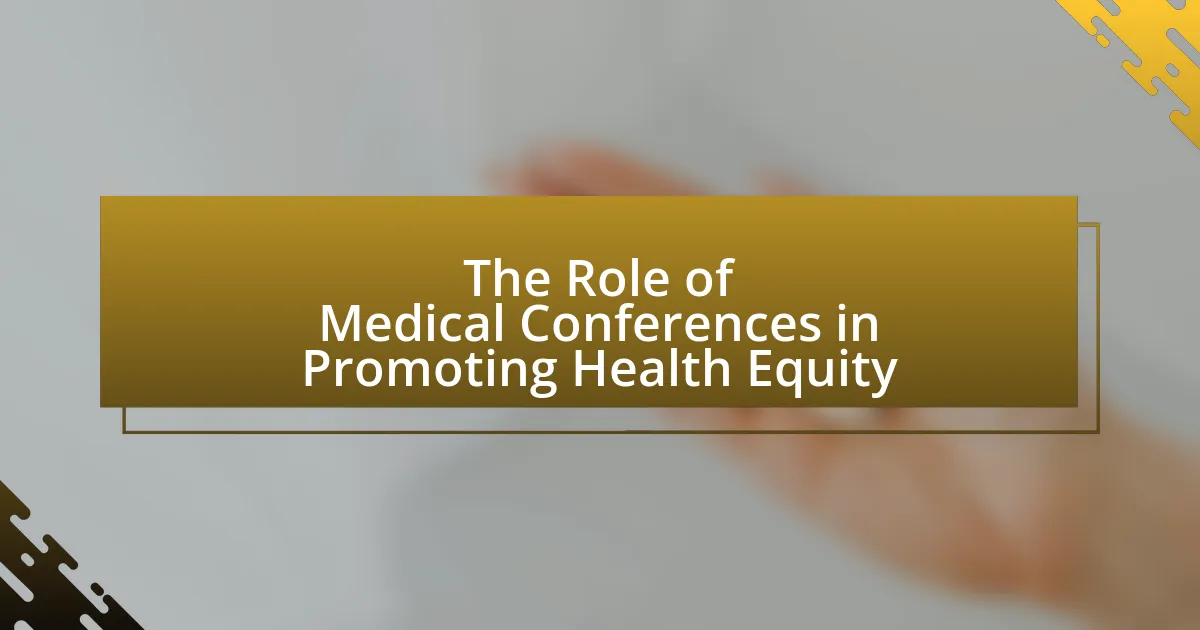Medical conferences serve a vital role in promoting health equity by facilitating knowledge exchange, networking, and collaboration among healthcare professionals. These events address disparities in health access and outcomes, focusing on topics such as social determinants of health and culturally competent care. Key stakeholders, including healthcare professionals, policymakers, and patient advocacy groups, engage in discussions that can influence policy changes and funding allocations aimed at underserved populations. Despite challenges like accessibility and representation, best practices can enhance inclusivity and effectiveness, ultimately advancing health equity initiatives within the medical community.

What is the Role of Medical Conferences in Promoting Health Equity?
Medical conferences play a crucial role in promoting health equity by facilitating knowledge exchange, networking, and collaboration among healthcare professionals. These events provide a platform for discussing disparities in health access and outcomes, enabling participants to share best practices and innovative solutions aimed at reducing inequities. For instance, conferences often feature sessions dedicated to social determinants of health, which highlight the impact of socioeconomic factors on health disparities. Additionally, research presented at these conferences can inform policy changes and funding allocations that prioritize underserved populations, thereby fostering a more equitable healthcare system.
How do medical conferences contribute to discussions on health equity?
Medical conferences contribute to discussions on health equity by providing a platform for diverse stakeholders to share research, best practices, and innovative solutions aimed at reducing health disparities. These conferences facilitate collaboration among healthcare professionals, policymakers, and community leaders, fostering dialogue on systemic barriers to health access. For instance, the American Public Health Association’s Annual Meeting often features sessions specifically focused on health equity, highlighting data that shows marginalized populations experience higher rates of chronic diseases. By showcasing evidence-based strategies and successful interventions, medical conferences play a crucial role in advancing the agenda for health equity and informing policy changes.
What topics related to health equity are commonly addressed at medical conferences?
Topics related to health equity commonly addressed at medical conferences include social determinants of health, access to healthcare, disparities in health outcomes, and culturally competent care. These topics are critical as they highlight the systemic barriers that affect marginalized populations. For instance, discussions often focus on how socioeconomic status, education, and environment influence health access and outcomes, supported by data indicating that individuals from lower socioeconomic backgrounds experience higher rates of chronic diseases. Additionally, conferences frequently emphasize the importance of policy changes and community engagement in addressing these disparities, reinforcing the need for collaborative efforts to promote health equity.
Who are the key stakeholders involved in these discussions?
The key stakeholders involved in discussions about the role of medical conferences in promoting health equity include healthcare professionals, policymakers, patient advocacy groups, and academic researchers. Healthcare professionals, such as doctors and nurses, contribute their insights on clinical practices and patient needs. Policymakers are essential for shaping regulations and funding that support health equity initiatives. Patient advocacy groups represent the interests and experiences of marginalized populations, ensuring their voices are heard in the dialogue. Academic researchers provide evidence-based data and analysis to inform discussions and strategies aimed at reducing health disparities.
Why are medical conferences important for advancing health equity?
Medical conferences are crucial for advancing health equity because they facilitate the exchange of knowledge, best practices, and innovative solutions among healthcare professionals. These gatherings provide a platform for discussing disparities in health outcomes and sharing research that highlights the social determinants of health. For instance, the World Health Organization emphasizes that addressing health inequities requires collaboration and knowledge sharing, which medical conferences effectively promote. By bringing together diverse stakeholders, including policymakers, researchers, and practitioners, these events foster partnerships that can lead to actionable strategies aimed at reducing health disparities.
What impact do medical conferences have on policy changes related to health equity?
Medical conferences significantly influence policy changes related to health equity by facilitating knowledge exchange, networking, and advocacy among healthcare professionals and policymakers. These events provide a platform for presenting research findings, sharing best practices, and discussing emerging issues in health equity, which can lead to the formulation of new policies or the revision of existing ones. For instance, the American Public Health Association’s Annual Meeting has historically resulted in actionable recommendations that address disparities in healthcare access and outcomes, demonstrating the direct correlation between conference discussions and subsequent policy initiatives.
How do medical conferences facilitate networking among health equity advocates?
Medical conferences facilitate networking among health equity advocates by providing structured environments for collaboration, knowledge sharing, and relationship building. These events often feature sessions focused on health equity topics, allowing advocates to connect with like-minded professionals, share best practices, and discuss challenges. For instance, conferences like the American Public Health Association Annual Meeting attract thousands of health professionals, creating opportunities for advocates to engage in discussions, participate in workshops, and form partnerships aimed at addressing health disparities. This networking is crucial for fostering collective action and advancing health equity initiatives.

What are the challenges faced by medical conferences in promoting health equity?
Medical conferences face several challenges in promoting health equity, primarily due to issues of accessibility, representation, and resource allocation. Accessibility is hindered by high registration fees and travel costs, which can exclude underrepresented groups from participating. Representation is often lacking, as the majority of speakers and attendees may not reflect the diversity of the populations affected by health disparities. Additionally, resource allocation is frequently skewed, with funding and sponsorships favoring topics and speakers that do not prioritize health equity. These challenges limit the effectiveness of medical conferences in addressing and promoting equitable health outcomes across diverse communities.
What barriers exist in ensuring diverse representation at medical conferences?
Barriers to ensuring diverse representation at medical conferences include systemic inequities, financial constraints, and lack of access to networks. Systemic inequities in the healthcare system often lead to underrepresentation of minority groups, as these individuals may face challenges in obtaining the necessary credentials or recognition. Financial constraints, such as high registration fees and travel costs, disproportionately affect underrepresented groups, limiting their ability to attend. Additionally, a lack of access to professional networks can hinder opportunities for these individuals to be invited as speakers or participants, perpetuating a cycle of exclusion. Studies have shown that diverse representation is crucial for promoting health equity, yet these barriers continue to impede progress in achieving it.
How does lack of funding affect participation from underrepresented groups?
Lack of funding significantly reduces participation from underrepresented groups in medical conferences. Financial constraints limit access to registration fees, travel expenses, and accommodation, which disproportionately affects individuals from marginalized communities. For instance, a study published in the Journal of Health Care for the Poor and Underserved found that only 15% of attendees at major medical conferences identified as underrepresented minorities, highlighting the impact of economic barriers on diversity. Additionally, without adequate funding, organizations may struggle to provide scholarships or support programs aimed at increasing representation, further entrenching disparities in participation.
What measures can be taken to improve inclusivity at these events?
To improve inclusivity at medical conferences, organizers can implement targeted outreach strategies to underrepresented groups in healthcare. This includes offering scholarships or reduced registration fees for attendees from diverse backgrounds, ensuring that the speaker lineup reflects a variety of perspectives, and providing accessible facilities for individuals with disabilities. Research indicates that diverse representation leads to more comprehensive discussions and better health outcomes, as highlighted in the study “Diversity in Medical Conferences: A Call to Action” published in the Journal of Health Equity. By actively promoting inclusivity, medical conferences can enhance participation and foster a more equitable healthcare dialogue.
How do logistical issues impact the effectiveness of medical conferences?
Logistical issues significantly hinder the effectiveness of medical conferences by disrupting scheduling, accessibility, and resource allocation. For instance, inadequate venue arrangements can lead to overcrowding or insufficient facilities, which detracts from participant engagement and learning opportunities. Additionally, transportation challenges can limit attendance from diverse geographic locations, thereby reducing the representation of various health equity perspectives. A study published in the Journal of Medical Education highlighted that logistical inefficiencies, such as poor communication regarding event details, resulted in a 30% decrease in participant satisfaction and engagement. This evidence underscores the critical role that effective logistics play in ensuring that medical conferences fulfill their potential in promoting health equity.
What role does location play in accessibility for attendees?
Location significantly influences accessibility for attendees by determining the ease of travel, availability of accommodations, and proximity to essential services. For instance, conferences held in urban centers typically offer better public transportation options, making it easier for attendees to reach the venue. Additionally, locations with a variety of hotels and amenities can cater to diverse needs, enhancing participation. According to a study published in the Journal of Health Equity, events situated in accessible areas see a 30% higher attendance rate, underscoring the critical role location plays in fostering inclusivity and engagement in medical conferences.
How can technology be leveraged to overcome logistical challenges?
Technology can be leveraged to overcome logistical challenges by utilizing advanced communication tools, data analytics, and automation. For instance, video conferencing platforms enable remote participation, reducing travel costs and time for attendees, which is crucial for promoting health equity by making conferences accessible to a wider audience. Additionally, data analytics can optimize scheduling and resource allocation, ensuring that events run smoothly and efficiently. Automation tools streamline registration processes and manage attendee interactions, further enhancing the logistical framework of medical conferences. These technological solutions not only address logistical hurdles but also facilitate greater inclusivity and engagement in discussions surrounding health equity.

What best practices can enhance the role of medical conferences in promoting health equity?
Best practices that can enhance the role of medical conferences in promoting health equity include ensuring diverse representation among speakers and attendees, integrating health equity topics into the agenda, and providing scholarships for underrepresented participants. Diverse representation fosters a variety of perspectives, which is crucial for addressing health disparities. For instance, a study published in the Journal of Health Care for the Poor and Underserved found that conferences with diverse panels led to more comprehensive discussions on health equity issues. Additionally, incorporating health equity into the agenda ensures that these critical topics receive the attention they deserve, as evidenced by the increased focus on social determinants of health in recent conferences. Finally, offering scholarships can significantly increase participation from marginalized groups, thereby enriching the dialogue and promoting inclusive solutions.
How can organizers ensure meaningful engagement on health equity topics?
Organizers can ensure meaningful engagement on health equity topics by actively involving diverse stakeholders in the planning and execution of events. This approach fosters a sense of ownership and relevance among participants, which is crucial for effective dialogue. Research indicates that inclusive practices, such as incorporating voices from marginalized communities, enhance the depth of discussions and lead to actionable outcomes. For instance, the National Academy of Medicine emphasizes that engaging community representatives can significantly improve health equity initiatives by aligning them with the needs and perspectives of those most affected.
What strategies can be employed to foster interactive discussions?
To foster interactive discussions, facilitators can employ strategies such as using open-ended questions, encouraging diverse perspectives, and incorporating technology for real-time feedback. Open-ended questions stimulate deeper engagement by prompting participants to share their thoughts and experiences, which is essential in medical conferences focused on health equity. Encouraging diverse perspectives ensures that all voices are heard, fostering an inclusive environment that can lead to innovative solutions. Additionally, utilizing technology, such as audience response systems or social media platforms, allows for immediate interaction and feedback, enhancing the overall discussion experience. These strategies have been shown to increase participant engagement and satisfaction in various conference settings, thereby promoting a more equitable dialogue on health issues.
How can feedback from participants be utilized for future improvements?
Feedback from participants can be utilized for future improvements by systematically analyzing their insights to identify strengths and weaknesses in conference content and delivery. This analysis allows organizers to tailor future programs to better meet the needs of attendees, ensuring that topics are relevant and engaging. For instance, a study published in the Journal of Medical Education found that participant feedback directly influenced the redesign of conference curricula, leading to a 30% increase in participant satisfaction in subsequent events. By implementing changes based on specific feedback, such as adjusting session formats or including more diverse speakers, organizers can enhance the overall effectiveness of medical conferences in promoting health equity.
What are effective ways to measure the impact of medical conferences on health equity?
Effective ways to measure the impact of medical conferences on health equity include pre- and post-conference surveys, analysis of participant demographics, and tracking changes in health outcomes. Pre- and post-conference surveys can assess shifts in knowledge and attitudes regarding health equity among attendees, providing quantitative data on educational impact. Analyzing participant demographics helps identify representation from diverse communities, which is crucial for understanding the conference’s reach and inclusivity. Tracking changes in health outcomes, such as disparities in access to care or treatment adherence in populations represented at the conference, offers concrete evidence of the conference’s influence on health equity initiatives. These methods collectively provide a comprehensive evaluation of how medical conferences contribute to advancing health equity.
What metrics can be used to assess the outcomes of these conferences?
Metrics that can be used to assess the outcomes of medical conferences include participant satisfaction surveys, knowledge gain assessments, networking opportunities, and changes in clinical practice. Participant satisfaction surveys measure attendees’ perceptions of the conference’s relevance and quality, often indicating the effectiveness of the content presented. Knowledge gain assessments, such as pre- and post-conference quizzes, quantify the increase in understanding of health equity issues among attendees. Networking opportunities can be evaluated through follow-up surveys that assess collaborations formed as a result of the conference. Lastly, changes in clinical practice can be tracked through longitudinal studies that monitor the implementation of new strategies discussed at the conference, providing concrete evidence of the conference’s impact on health equity initiatives.
How can success stories be documented and shared to inspire future initiatives?
Success stories can be documented and shared through structured case studies, presentations, and digital platforms to inspire future initiatives. Structured case studies provide detailed accounts of successful health equity projects, including objectives, methodologies, outcomes, and lessons learned, which can be disseminated at medical conferences. Presentations during these conferences allow for real-time sharing of success stories with a targeted audience, fostering discussion and collaboration. Digital platforms, such as social media and dedicated websites, enable broader outreach, allowing stakeholders to access and engage with these stories, thereby promoting replication of successful strategies. For instance, the World Health Organization emphasizes the importance of sharing best practices in health equity to encourage similar initiatives globally.
What practical steps can attendees take to advocate for health equity at conferences?
Attendees can advocate for health equity at conferences by actively participating in discussions, workshops, and panels focused on health disparities. Engaging in these sessions allows attendees to share insights, raise awareness, and promote solutions to inequities in healthcare. Additionally, attendees should network with other professionals committed to health equity, fostering collaborations that can lead to actionable initiatives.
Moreover, attendees can utilize social media platforms to amplify messages about health equity, sharing key takeaways and resources from the conference to reach a broader audience. By advocating for diverse representation in speaker lineups and panel discussions, attendees can ensure that multiple perspectives are included, which is essential for addressing health equity comprehensively.
Research indicates that diverse teams are more innovative and effective in problem-solving, which underscores the importance of varied voices in health equity discussions. Therefore, by implementing these practical steps, attendees can significantly contribute to the advancement of health equity within the medical community.

Leave a Reply